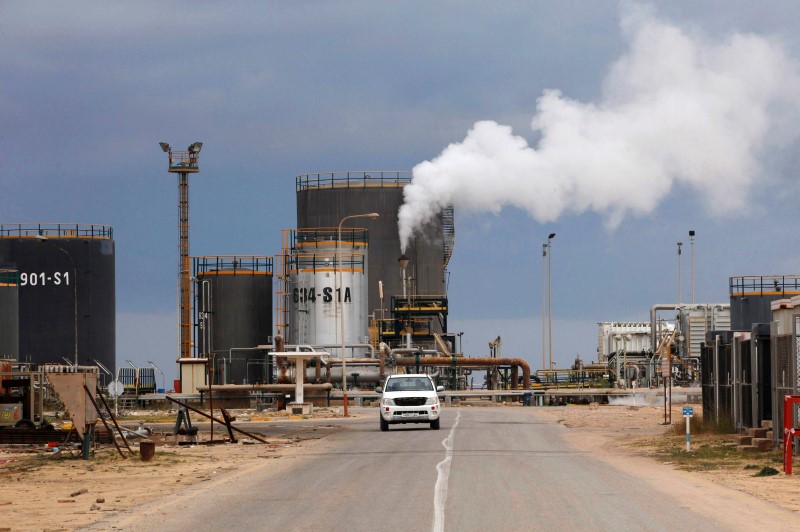(Bloomberg) -- April Dong stared in disbelief at the oil price on her phone.
The bank clerk in China’s Hebei province had invested 40,000 yuan ($5,600) in U.S. crude futures through popular bank products, and she was watching it vanish in real time.
It was Monday night in China, just about the time traders in New York were having their morning coffee. West Texas Intermediate had been sliding all day since it opened at about $18 a barrel. When prices hit $11, Dong closed out, having lost about half her money.
Her pain has been felt throughout Asia this week by retail investors who thought they were buying the dip but instead got crushed by oil’s unprecedented collapse below zero. From Beijing to Seoul to Mumbai, the oil-tracking funds that offered cheap entry for the layperson suffered substantial losses.
“I’m not an oil professional, it’s natural that I don’t know the concept of negative pricing and rolling,” Dong, 31, said in a phone interview. “Oil should at least have some kind of value. There’s no way it should fall into sub-zero value.”
Investors are being rattled because of a rarely used but very important detail in the WTI contract: anyone holding futures after they expire could be forced to take delivery of crude in the U.S. oil hub of Cushing, Oklahoma. For the May contract, that expiration happened Tuesday night.
Storage tanks there are nearing capacity as fuel demand is decimated by widespread lockdown measures to slow the spread of the coronavirus. With fewer people able to buy crude and store it, liquidity in near-term contracts dries up, making squeezes like Monday’s more likely.
Bank of China
Dong’s lucky she cashed out when she did. Most of her investment was in a Bank of China Ltd. product pegged to May WTI futures. That means her money was tied up in a contract that fell to as low as minus $40.32 a barrel just hours after she cut her losses.
On Tuesday, Bank of China suspended trading for products linked to U.S. crude futures while it checked with exchange owner CME Group Inc. (NASDAQ:CME) on settlement arrangements for negative prices. It then stopped allowing new positions in its U.S. and U.K. crude products because of market and settlement risks.
By Wednesday, the bank said on its website that the underlying settlement value for the May contract is minus 266.12 yuan a barrel, which, after accounting for some currency fluctuations, is roughly the Nymex Monday close of minus $37.63. Bank of China said in a statement Wednesday night that it settled the contracts in accordance with guidelines previously disclosed to clients.
The chaos played out elsewhere in Asia this week. In South Korea, a brokerage saw its trading system freeze when prices went negative, leaving customers helpless as they watched losses pile up. Exotic structured notes in the country tied to oil were also at risk of massive losses. A Hong Kong exchange-traded oil fund with more than $500 million in assets as of Monday plummeted 46% Wednesday after it decided to sell its June contracts and repurchase more-expensive September derivatives.
‘Total Loss’
The Hong Kong fund, Samsung (KS:005930) S&P GSCI Crude Oil ER Futures ETF, warned that if it held onto June contracts the net asset value may drop to zero and investors may suffer “a total loss” in a “worst case scenario.”
In India, clients of Motilal Oswal Financial Services Ltd. had outstanding dues of about $10 million, it said in an email, from losses on their WTI-linked oil futures on the Multi Commodity Exchange of India.
“The stand taken by the exchange is incorrect, illogical and unprecedented from the overall commodity derivative market eco-system perspective,” it said, referring to allowing negative settlement prices. “We hope the regulator will also look into this issue in the right perspective.”
The exchange, known as MCX, wasn’t immediately able to comment.
The United States Oil Fund (NYSE:USO), the biggest ETF tracking crude prices, took a series of unusual actions after losing a third of its value in two days. It had to suspend the issuance of new shares, an action that could leave it untethered from prices it’s supposed to track. Interactive Brokers Group Inc. on Tuesday announced an $88 million provisionary loss due to several customers who held long positions in the May WTI contract when it expired, triggering losses that outstripped the equity in their accounts.
Retail Inflows
Given the difficulty and costs of storing oil, even in normal times, investors typically never keep positions into expiration, Goldman Sachs Group Inc (NYSE:GS). said in a note. The surge of inflows to oil in recent weeks suggest that retail investors were likely still long May WTI contracts into this week, the bank said.
For Dong, who studied alongside oil industry professionals in her MBA program, the experience has soured her on future investments in crude.
“If the underlying contract keeps rolling, then it’s a short-term product. But I’m a long-term value investor,” she said. “I discovered from this incident that oil wealth products are not my thing.”
(Updates with Bank of China statement in 10th paragraph)
©2020 Bloomberg L.P.
